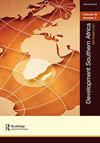Climate and competing priorities in South Africa: an analysis of the population’s attitudes and perceptions toward environmental issues
IF 1.3
4区 经济学
Q3 DEVELOPMENT STUDIES
引用次数: 0
Abstract
ABSTRACT The known and expected consequences of climate change are dire and will hamper social and development. However, competing priorities, such as poverty, HIV and violence tend to be more visible on government agendas. In South Africa, growing inequalities result in the population being more concerned with socioeconomic problems. However, issues of poverty and unemployment, among others, are also the result of environmental degradation. This study examines the attitudes of South Africans toward environmental issues in relation to competing challenges. This cross-sectional study uses the nationally representative 2017 South African Social Attitudes Survey (SASAS) of approximately 3 173 (n) adults. Results show that environmental issues rank 17th among the most important challenges. Further, 20.08% of the population who cite economic, 28.66% with social and 15.96% who report health competing interests also cite environmental concerns. Those who cited social competing interests were also more likely to report environmental concerns (OR = 1.56; CI: 1.55152–1.55866). In conclusion, environmental issues are not highly ranked among the priorities of the population. However, commonalities between climate and economic, social and health challenges is an ideal place to start with information dissemination.南非的气候和竞争优先事项:对人口对环境问题的态度和看法的分析
摘要气候变化的已知和预期后果是可怕的,将阻碍社会和发展。然而,贫困、艾滋病毒和暴力等相互竞争的优先事项往往在政府议程上更为明显。在南非,日益严重的不平等导致人们更加关心社会经济问题。然而,贫困和失业等问题也是环境退化的结果。这项研究考察了南非人对环境问题与竞争挑战的态度。这项横断面研究使用了具有全国代表性的2017年南非社会态度调查(SASAS),调查对象约为3173(n)名成年人。结果显示,环境问题在最重要的挑战中排名第17位。此外,20.08%的人口提到经济问题,28.66%的人口提到社会问题,15.96%的人口提到健康竞争利益也提到环境问题。那些引用社会竞争利益的人也更有可能报告环境问题(OR = 1.56;CI:1.55152-1.55866)。总之,环境问题在人口的优先事项中排名不高。然而,气候与经济、社会和健康挑战之间的共性是信息传播的理想起点。
本文章由计算机程序翻译,如有差异,请以英文原文为准。
求助全文
约1分钟内获得全文
求助全文
来源期刊

Development Southern Africa
DEVELOPMENT STUDIES-
CiteScore
4.20
自引率
7.10%
发文量
42
期刊介绍:
The Development Southern Africa editorial team are pleased to announce that the journal has been accepted into the Thomson Reuters (formerly ISI) Social Science Citation Index. The journal will receive its first Impact Factor in 2010. Development Southern Africa offers a platform for expressing views and encouraging debate among development specialists, policy decision makers, scholars and students in the wider professional fraternity and especially in southern Africa. The journal publishes articles that reflect innovative thinking on key development challenges and policy issues facing South Africa and other countries in the southern African region.
 求助内容:
求助内容: 应助结果提醒方式:
应助结果提醒方式:


